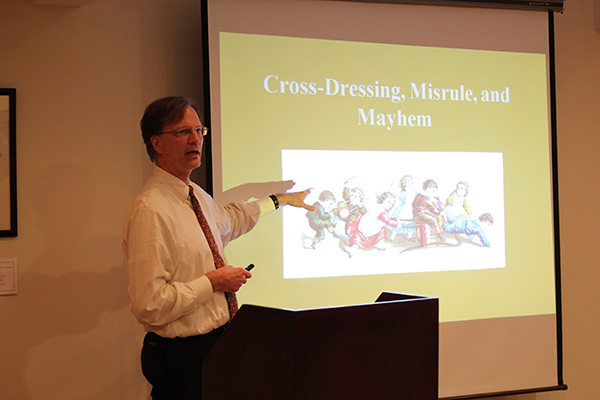

During the 1800s, Christmas in colonial America was a “special time of year” where workers demanded appreciation from the upper classes of society. Today it is viewed in a very different light.
Assistant Professor Reynolds Scott-Childress of the History Department further explored this perspective on Christmas during the presentation of “Cross-Dressing, Misrule and Mayhem: Christmas Before Santa in Early America” at Historic Huguenot Street on Dec. 1.
Scott-Childress said it is crucial for people to understand that Christmas is a way to see how the developing middle class tried to privatize a public event.
The lower classes took to the streets after a long year during Christmas time to demand “social betters” from the upper classes. They demanded treats, beer and wine — anything to make them happy. If the upper class did not give into their demands, they would find their barns destroyed or their homes broken into.
The presentation focused on how the Puritans saw Christmas. During the early 1600s and well into the 1700s, the Puritans saw Christmas as a time of social anarchy and chaos. They hated the misrule and public drinking associated with the holiday.
Scott-Childress said one of the practices the Puritans hated was mummers. Mummers is when adults wore masks or soot to cover their faces as they engaged in the disarray they created on Dec. 25.
As a result of social anarchy, the middle classes took it upon themselves to make the holiday a private affair to be celebrated only among families.
Scott-Childress said, the upper classes added the religious aspect to Christmas in the 1800s as a way to bring the celebration into their separate churches. Christmas was no longer celebrated as a community.
Scott-Childress said some believe the religious side of Christmas has been overlooked and Christmas has lost religious value.
“Christmas was always impure and secular,” Scott-Childress said. “It was about social relations, not about celebrating Jesus.”
Scott-Childress said Christmas has always been about excess. Workers from colonial America wanted gifts from the upper classes, like alcohol and extra clothes.
Today, Scott-Childress said it is all about the gifts. He said people buy in excess and all items must be novel rather than practical.
“It’s a buying orgy, buying more than we really need, buying treats,” Scott-Childress said.
Scott-Childress said this excess is not a sign of societal decline by any means.
“It’s all about celebrating each others company and celebrating relationships,” Scott-Childress said. “Those relationships need to be defined clearly.”
